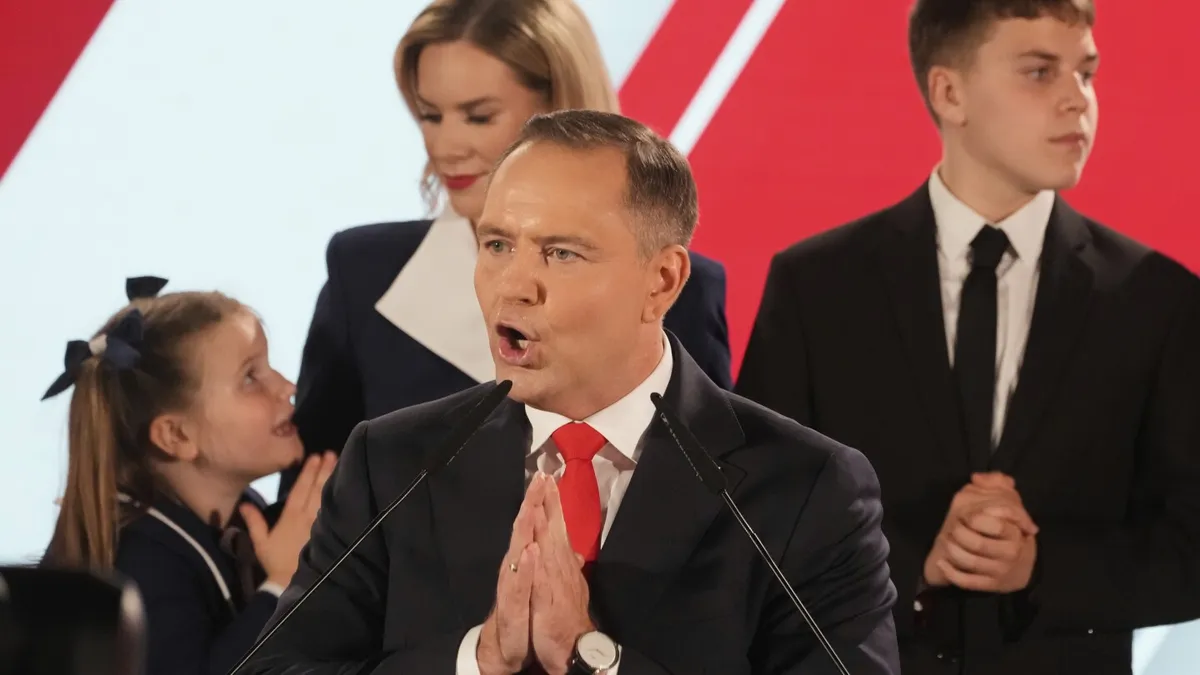
In a closely contested election, Karol Nawrocki, the conservative candidate, emerged victorious in Poland's presidential runoff held over the weekend. According to the final vote count released on Monday, Nawrocki garnered 50.89% of the votes, narrowly defeating the liberal mayor of Warsaw, Rafał Trzaskowski, who received 49.11%. This tight race heightened tensions across the nation, revealing significant divisions along the eastern flank of NATO and the European Union.
The election had the country on edge, particularly following a first round two weeks prior. An early exit poll released on Sunday evening hinted at a potential victory for Trzaskowski, but as updated polling came in, the picture began to shift dramatically. The final outcome signals a shift towards a more nationalist approach in Polish politics under Nawrocki's leadership, a candidate backed by former U.S. President Donald Trump.
While Poland's political landscape is predominantly driven by the prime minister, who is selected by the parliament, the role of the president is far from ceremonial. The president wields significant influence over foreign policy and has the power to veto legislation. Nawrocki will take over from Andrzej Duda, a conservative leader whose second and final term concludes on August 6.
The newly-elected president presents a considerable challenge for Prime Minister Donald Tusk, who assumed office in late 2023 after a coalition government that spans a wide ideological spectrum. This coalition has struggled to deliver on various electoral promises, including the reform of restrictive abortion laws. Duda's veto power further complicates Tusk's ability to reverse controversial laws that the European Union has criticized as undemocratic, leaving Tusk in a precarious position.
Karol Nawrocki, a 42-year-old historian and political newcomer, was chosen by the Law and Justice party as part of its strategy for a fresh start. The party previously governed Poland from 2015 to 2023, losing power to Tusk's centrist coalition. Nawrocki was viewed as a new face, free from the controversies that surrounded the party during its eight years in power. His most recent role was as the head of the Institute of National Remembrance, known for promoting nationalist historical narratives.
Nawrocki's tenure included efforts to dismantle monuments honoring the Soviet Red Army, which led to his inclusion on a wanted list by Russia, according to Polish media sources. Supporters portray him as a champion of traditional, patriotic values, appealing particularly to those who resist secular trends, including increased visibility for LGBTQ+ communities.
The influence of Donald Trump on Nawrocki's campaign cannot be understated. Trump openly endorsed Nawrocki, and the conservative group CPAC hosted its first meeting in Poland to rally support for him. Prominent Trump ally, Kristi Noem, the U.S. Homeland Security Secretary, vocally supported Nawrocki, encouraging Polish citizens to vote for him. The presence of approximately 10,000 U.S. troops stationed in Poland suggests that military relations could strengthen under Nawrocki's presidency.
Many of Nawrocki's supporters echo a sentiment that his presidency will restore a sense of "normality," akin to what they believe Trump has achieved in the United States. At his rallies, U.S. flags frequently appeared, symbolizing the hopeful expectations of his supporters for improved relations with the Trump administration.